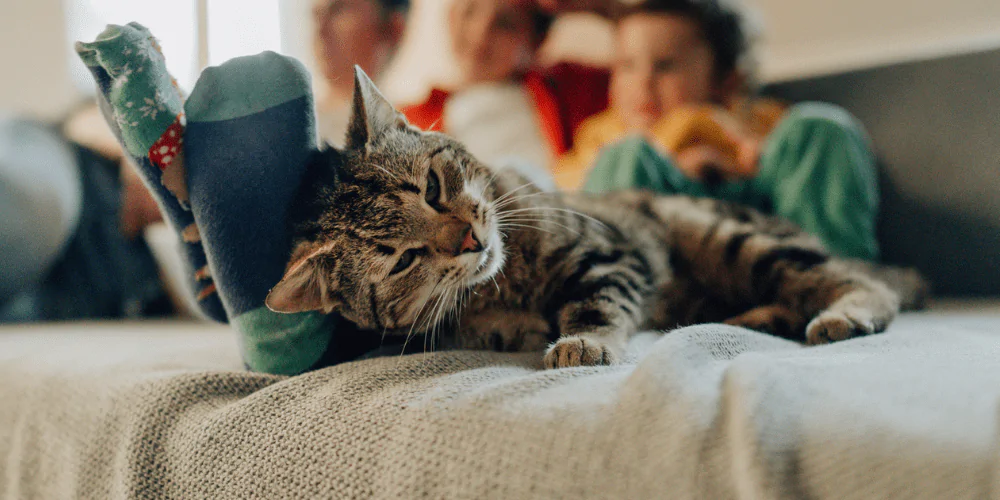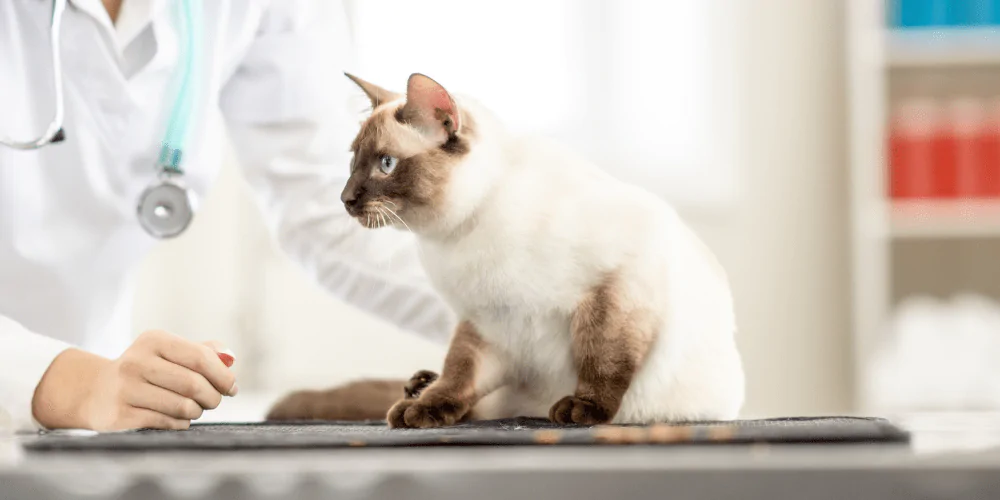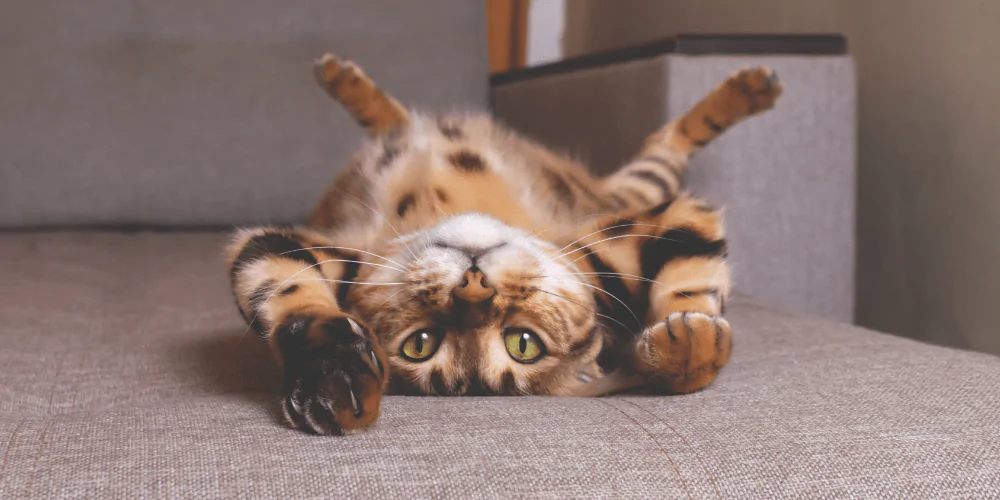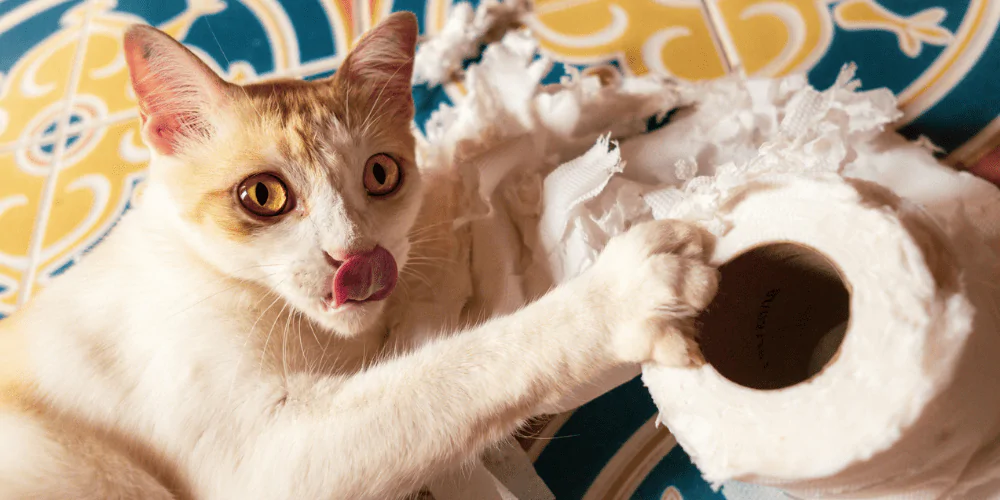
How does neutering affect a cat’s behaviour?

Lucy Hoile
14 February 2024 | 5 minutes read
Choosing to neuter your cat is a responsible decision for any feline parent. It helps reduce your cat’s risk of medical issues and stops unwanted pregnancies.
But how exactly does neutering affect behaviour? Join expert cat behaviourist Lucy Hoile as she deep dives into what neutering means for your favourite feline’s personality.
- Why should you neuter a cat?
- How invasive is cat neutering?
- Male cat behaviour before neutering
- Female cat behaviour before neutering
> How soon should I neuter my female cat?
> When can you neuter a cat after having kittens? - Cat behaviour after neutering
> Does neutering a cat stop destructive behaviour?

Why should you neuter a cat?
Here are some of the reasons why you should be neutering your cat:
- Contrary to outdated beliefs, females do not need to have a litter to be behaviourally healthy cats.
- As cute as kittens are, there are lots of them in the world. This leads to a snowball effect of kittens having more kittens and the UK already has an overpopulation crisis.
- Be mindful of letting your male cat go out as he will try and mate with every female in the area. Also, think carefully about letting your cat have kittens when there are lots of lovely rescue cats waiting for good homes.
- Pet cats are generally happier being neutered as they can focus on being part of your family and not hyper-fixated on mating.

How invasive is cat neutering?
Neutering is a much less invasive procedure for male cats. The procedure cost is normally cheaper (compared to females) and stitches aren’t needed after removing the testicles, so recovery time isn’t too lengthy.
Female felines have it tougher as they will have an incision to remove their ovaries and uterus.
- After her operation, a female cat will need:
- More time to recover
- Pain relief to help ease discomfort from surgery
- To be kept away from other pets in the house if they’re trying to play
Be aware that neutering isn’t covered under most cat insurance policies. So it’s important to plan this as an essential cost before you think about bringing home a cat.
Most rescues will always neuter their cats before they can be adopted. And some charities may be able to help you with the costs of castrating or spaying your feline.

Male cat behaviour before neutering
Most pet cats are neutered and intact males are quite uncommon.
The main priority of an unneutered cat is to go out and find a mate. This means venturing further and putting themselves in risky situations if your cat has free outdoor access.
In their search for a mate, an intact male cat can:
- Cross busy roads
- Get lost
- Get stuck somewhere
- Come across predators
- Fight more to compete for a female
- Spend more time outdoors and not with you (so you may be less bonded)
An intact male cat who is kept inside can show more frustrated behaviour like:
- Urine marking
- Scratching at the door
- Pacing
- Humping

Female cat behaviour before neutering
Compared to males, there is less general behavioural difference between a neutered and unneutered female cat. The main difference is that an intact female will come into heat, and when this happens you see:
- Long, drawn-out, very loud meowing
- Presenting (stomach on the ground, bottom in the air, tail to the side)
- Increased affectionate
- Rolling on her back more
- Face and body rubbing
- Spraying to attract a male
- Frustrated pacing around entrances
> How soon should I neuter my female cat?
There’s a very high chance an unneutered female will get pregnant – and do so quickly – if she gets outside. This is because the barbs on a male cat’s penis stimulate her eggs to be released.
Usually, an intact female cat will:
- Call out to the cats in her area
- Mate with more than one male, increasing the risk of a fight over her
- Have her neck bitten while she is mated (which is why mating isn’t pleasant for her)
A female cat can fall pregnant from four months old, so there’s no ‘safe window’ to let her outside. That’s why vets recommend neutering as soon as possible from the age of four months.
There’s no research to say neutering cats at this age has a negative behavioural impact on a cat but always consult your vet.
> When can you neuter a cat after having kittens?
Kittens have a very important window of learning while they are being weaned by mum. Taking her away from them too soon to have her spay operation can be harmful to their learning and development.
So you want to make sure the kittens are fully weaned and have left for their new homes, (which is ideally at 12 weeks old).
Keep your female away from any intact males in the meantime so she’s not mated again.

Cat behaviour after neutering
As long as you neuter early enough, you should see a reduction in all those mate-seeking behaviours. That means:
- Less humping
- Not roaming as far
- Less spraying
- Females not coming into heat
Some behaviours might continue if you neuter your cat later on, as by this point they’ve established a territory they want to maintain.
> Does neutering a cat stop destructive behaviour?
As we’ve learned, intact males can become very frustrated if they’re kept indoors and can’t look for a female. So neutering can help to ease frustration that comes from a desire to mate.
But general destructive behaviour is usually down to a lack of stimulation or trying to get your attention. Your cat may not have outdoor access to hunt and explore, get enough playtime, or may simply be a high-energy breed.
Destructive behaviour could be:
- Scratching at carpets
- Climbing up things
- Knocking things over
Giving your feline some more attention when they aren’t being destructive and making sure they have plenty of suitable scratching posts can help.
And if you’re struggling, try reaching out to a qualified feline behaviourist or vet behaviourist.


